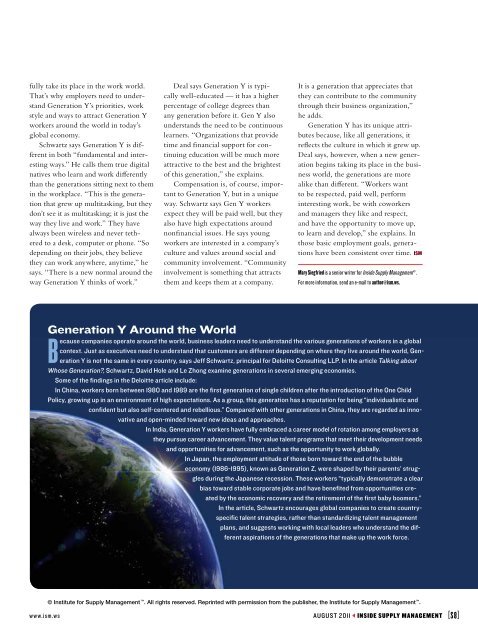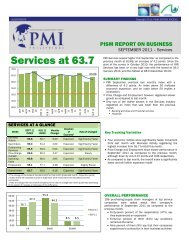Challenges FaCing gen Y - Philippine Institute for Supply ...
Challenges FaCing gen Y - Philippine Institute for Supply ...
Challenges FaCing gen Y - Philippine Institute for Supply ...
Create successful ePaper yourself
Turn your PDF publications into a flip-book with our unique Google optimized e-Paper software.
fully take its place in the work world.<br />
That’s why employers need to understand<br />
Generation Y’s priorities, work<br />
style and ways to attract Generation Y<br />
workers around the world in today’s<br />
global economy.<br />
Schwartz says Generation Y is different<br />
in both “fundamental and interesting<br />
ways.” He calls them true digital<br />
natives who learn and work differently<br />
than the <strong>gen</strong>erations sitting next to them<br />
in the workplace. “This is the <strong>gen</strong>eration<br />
that grew up multitasking, but they<br />
don’t see it as multitasking; it is just the<br />
way they live and work.” They have<br />
always been wireless and never tethered<br />
to a desk, computer or phone. “So<br />
depending on their jobs, they believe<br />
they can work anywhere, anytime,” he<br />
says. “There is a new normal around the<br />
way Generation Y thinks of work.”<br />
Deal says Generation Y is typically<br />
well-educated — it has a higher<br />
percentage of college degrees than<br />
any <strong>gen</strong>eration be<strong>for</strong>e it. Gen Y also<br />
understands the need to be continuous<br />
learners. “Organizations that provide<br />
time and financial support <strong>for</strong> continuing<br />
education will be much more<br />
attractive to the best and the brightest<br />
of this <strong>gen</strong>eration,” she explains.<br />
Compensation is, of course, important<br />
to Generation Y, but in a unique<br />
way. Schwartz says Gen Y workers<br />
expect they will be paid well, but they<br />
also have high expectations around<br />
nonfinancial issues. He says young<br />
workers are interested in a company’s<br />
culture and values around social and<br />
community involvement. “Community<br />
involvement is something that attracts<br />
them and keeps them at a company.<br />
It is a <strong>gen</strong>eration that appreciates that<br />
they can contribute to the community<br />
through their business organization,”<br />
he adds.<br />
Generation Y has its unique attributes<br />
because, like all <strong>gen</strong>erations, it<br />
reflects the culture in which it grew up.<br />
Deal says, however, when a new <strong>gen</strong>eration<br />
begins taking its place in the business<br />
world, the <strong>gen</strong>erations are more<br />
alike than different. “Workers want<br />
to be respected, paid well, per<strong>for</strong>m<br />
interesting work, be with coworkers<br />
and managers they like and respect,<br />
and have the opportunity to move up,<br />
to learn and develop,” she explains. In<br />
those basic employment goals, <strong>gen</strong>erations<br />
have been consistent over time. ISM<br />
Mary Siegfried is a senior writer <strong>for</strong> Inside <strong>Supply</strong> Management ® .<br />
For more in<strong>for</strong>mation, send an e-mail to author@ism.ws.<br />
Generation Y Around the World<br />
Because companies operate around the world, business leaders need to understand the various <strong>gen</strong>erations of workers in a global<br />
context. Just as executives need to understand that customers are different depending on where they live around the world, Generation<br />
Y is not the same in every country, says Jeff Schwartz, principal <strong>for</strong> Deloitte Consulting LLP. In the article Talking about<br />
Whose Generation?, Schwartz, David Hole and Le Zhong examine <strong>gen</strong>erations in several emerging economies.<br />
Some of the findings in the Deloitte article include:<br />
In China, workers born between 1980 and 1989 are the first <strong>gen</strong>eration of single children after the introduction of the One Child<br />
Policy, growing up in an environment of high expectations. As a group, this <strong>gen</strong>eration has a reputation <strong>for</strong> being “individualistic and<br />
confident but also self-centered and rebellious.” Compared with other <strong>gen</strong>erations in China, they are regarded as innovative<br />
and open-minded toward new ideas and approaches.<br />
In India, Generation Y workers have fully embraced a career model of rotation among employers as<br />
they pursue career advancement. They value talent programs that meet their development needs<br />
and opportunities <strong>for</strong> advancement, such as the opportunity to work globally.<br />
In Japan, the employment attitude of those born toward the end of the bubble<br />
economy (1986-1995), known as Generation Z, were shaped by their parents’ struggles<br />
during the Japanese recession. These workers “typically demonstrate a clear<br />
bias toward stable corporate jobs and have benefited from opportunities created<br />
by the economic recovery and the retirement of the first baby boomers.”<br />
In the article, Schwartz encourages global companies to create countryspecific<br />
talent strategies, rather than standardizing talent management<br />
plans, and suggests working with local leaders who understand the different<br />
aspirations of the <strong>gen</strong>erations that make up the work <strong>for</strong>ce.<br />
© <strong>Institute</strong> <strong>for</strong> <strong>Supply</strong> Management . All rights reserved. Reprinted with permission from the publisher, the <strong>Institute</strong> <strong>for</strong> <strong>Supply</strong> Management .<br />
www.ism.ws August 2011 Inside supply management [ S8]






